把句子改为否定句
英语肯定句改为否定句、陈述句改为一般疑问句的方法和技巧
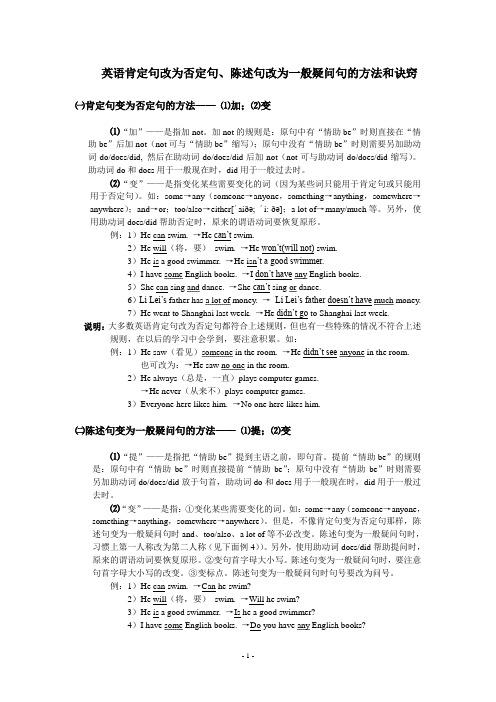
英语肯定句改为否定句、陈述句改为一般疑问句的方法和诀窍㈠肯定句变为否定句的方法——⑴加;⑵变⑴“加”——是指加not。
加not的规则是:原句中有“情助be”时则直接在“情助be”后加not(not可与“情助be”缩写);原句中没有“情助be”时则需要另加助动词do/does/did, 然后在助动词do/does/did后加not(not可与助动词do/does/did缩写)。
助动词do和does用于一般现在时,did用于一般过去时。
⑵“变”——是指变化某些需要变化的词(因为某些词只能用于肯定句或只能用用于否定句)。
如:some→any(someone→anyone,something→anything,somewhere→anywhere);and→or;too/also→either[´aiðə; ´i: ðə];a lot of→many/much等。
另外,使用助动词does/did帮助否定时,原来的谓语动词要恢复原形。
例:1)He can swim. →He can’t swim.2)He will(将,要)swim. →He won’t(will not) swim.3)He is a good swimmer. →He isn’t a good swimmer.4)I have some English books. →I don’t have any English books.5)She can sing and dance. →She can’t sing or dance.6)Li Lei’s father has a lot of money. →Li Lei’s father doesn’t have much money.7)He went to Shanghai last week. →He didn’t go to Shanghai last week.说明:大多数英语肯定句改为否定句都符合上述规则,但也有一些特殊的情况不符合上述规则,在以后的学习中会学到,要注意积累。
将下列句子改为否定句

将下列句子改为否定句,每空一词2. I was at the party last Friday.I at the party last Friday.4. There were many people in the park yesterdayThere _ many people in the park yesterday5. She has a TV in her bedroomShe a TV in her bedroom6. They have to clean the classroom after school.They clean the classroom after school.7. He had a big breakfast yesterday.He a big breakfast yesterday.9. Brad lives in Paris.Brad in Paris.10. Joan liked to play tennis and ping-pong.Joan to play tennis ping-pong.12. Jack does his homework at home.Jack his homework at home.13. I went to the beach with my friends last Sunday.I to the beach with my friends last Sunday.15. Do your homework at school.your homework at school.16. Let’s see the pandas first.see the pandas first.19. Jack would like a cup of tea.Jack a cup of tea.20. I think she is very quiet.I she very quiet.改为一般疑问句,每空一词。
英语变否定句的方法

英语变否定句的方法1、句中有be动词的,在be动词后加not;2,句中有情态动词的(can ,should,must ,would),在情态动词后面加not;3.句中没有be动词和情态动词的,在动词前加dont或doesnt ;①句中动词为原形的,加dont .如: I like apples. I dont like apples.②句中动词为三单式的,加doesnt,并将三单式的动词还原成原形。
如:He likes apples. He doesnt like apples.4、肯定句中的some在否定句中应改为any如:There are some students in the classroom. There are not any students in the classroom.2特别形式的否定句(1)肯定句含有every-的合成词时,变否定句时改为no-。
如:Everything is ready.Nothing is ready.(2)肯定句中含有always, usually和ever时,变否定句时改为never。
如:He is always late for school.He is never late for school.(3)肯定句含有many,much时,变否定句时分别改为few,little。
如:Many students know him.Few students know him.(4)肯定句中含有still时,变否定句时应改为no longer。
如:Tom is still in bed.Tom is no longer in bed.(5)肯定句含有both, both...and,all时,变否定句时应改为never,neither...nor,none。
如:Both of us are students.Neither of us is a student.(6)肯定句含有nearly, almost时,变否定句时应改为 hardly。
如何改否定句

句型转换专项训练班级:姓名:座号:一、如何改否定句。
否定句就是表示“无、不、没有”等的句子。
1、在be动词后面加not。
可缩略为:is not=isn't are not=aren't(过去式was not=wasn't were not=weren't).句中的some改为any。
如:(1)I'm going to the Great Wall.→I'm not going to the Great Wall.(2)There is a cinema near here.→There isn't a cinema near here.(3)They are going to take a trip.→They aren't going to take a trip.2、在情态动词can,must,should等后面加not,可缩略为:cannot=can'tmust not=mustn't should not=shouldn't。
如:He can go to the bus stop on foot.→He can't go to the bus stop on foot.3、在主语后面,动词前面加助动词的否定形式don't,(第三人称单数用doesn't).过去式用didn't.如:(1)I go to school by subway.→I don't go to school by subway.(2)Mike goes to school by subway.→Mike doesn't go to school by subway.(3)Open the door.→Don't open the door.二、如何改一般疑问句。
1、将句中的be动词(am,is,are过去式was,were)或情态动词can提在句子开头,句号改为问号。
肯定句变否定句练习
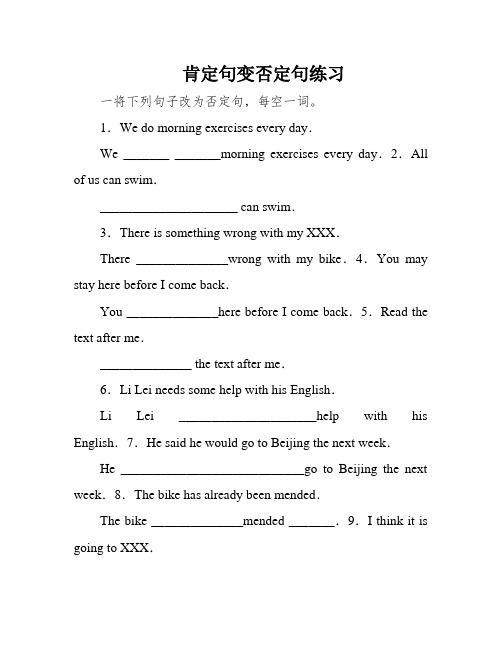
肯定句变否定句练习一将下列句子改为否定句,每空一词。
1.We do morning exercises every day.We _______ _______morning exercises every day.2.All of us can swim._____________________ can swim.3.There is something wrong with my XXX.There ______________wrong with my bike.4.You may stay here before I come back.You ______________here before I come back.5.Read the text after me.______________ the text after me.6.Li Lei needs some help with his English.Li Lei _____________________help with his English.7.He said he would go to Beijing the next week.He ____________________________go to Beijing the next week.8.The bike has already been mended.The bike ______________mended _______.9.I think it is going to XXX.I ____________________________going to rain tomorrow.二把下列句子变成否定句。
1. I am Tom.______________________________2. He is nine.______________________________3. They are pupils.______________________________4. I can fly a kite.______________________________5. He can make a toy._____________________________6. You must go home now._____________________________7. I like Jinan.8. XXX.9. He has many books.10. He has some books.11. There is a pen on the desk.12. There is some water in the glass._________________________________________13. You have got some books.__________________________________________14. You have some books.三变一定句为否认句1. I like to watch TV..2. Xiao Fang and I go to the library every Saturday..3. Tim swims very well..4. Mr. Smith has many books about the cars. .5. I want to play with my friends..6. We feel cold today..7. Bob reads English everyday..8. We do our XXX..9. Mr. White has two houses.10.I’m old, but you’re young.11. He was reading and I was writing.12. He has a car.13. He had some dictionaries.14. You have to go with him.15. XXX.16. We had a good holiday.17. I can finish the work in an hour.18. You must go with us.19. We should help them.20. He works in a XXX.21. We often hear from her.22. I met her at the XXX.四把下列肯定句变成否定句。
肯定句变否定句的基本方法
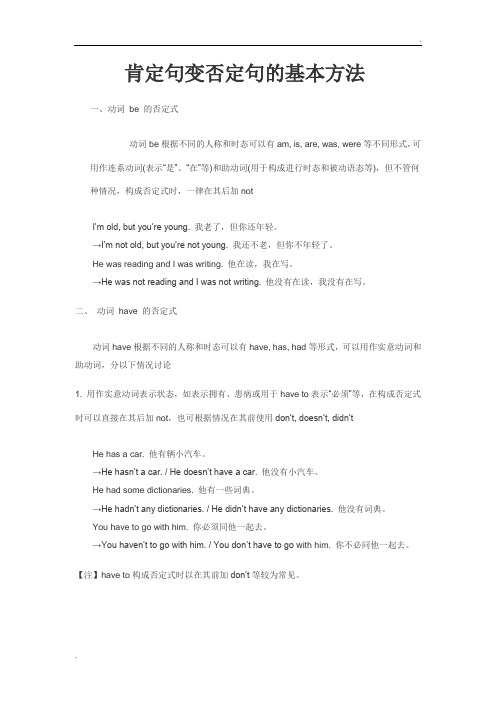
肯定句变否定句的基本方法一、动词be 的否定式动词be根据不同的人称和时态可以有am, is, are, was, were等不同形式,可用作连系动词(表示“是”、“在”等)和助动词(用于构成进行时态和被动语态等),但不管何种情况,构成否定式时,一律在其后加notI’m old, but you’re young. 我老了,但你还年轻。
→I’m not old, but you’re not young. 我还不老,但你不年轻了。
He was reading and I was writing. 他在读,我在写。
→He was not reading and I was not writing. 他没有在读,我没有在写。
二、动词have 的否定式动词have根据不同的人称和时态可以有have, has, had等形式,可以用作实意动词和助动词,分以下情况讨论1. 用作实意动词表示状态,如表示拥有、患病或用于have to表示“必须”等,在构成否定式时可以直接在其后加not,也可根据情况在其前使用don’t, doesn’t, didn’tHe has a car. 他有辆小汽车。
→He hasn’t a car. / He doesn’t have a car. 他没有小汽车。
He had some dictionaries. 他有一些词典。
→He hadn’t any dictionaries. / He didn’t have any dictionaries. 他没有词典。
You have to go with him. 你必须同他一起去。
→You haven’t to go with him. / You don’t have to go w ith him. 你不必同他一起去。
【注】have to构成否定式时以在其前加don’t等较为常见。
2. 用作实意动词表示动作,如表示“吃(=eat)”、“喝(=drink)”、“拿(=take)”、“收到(=receive)”、“度过(=spend)”等,构成否定式时不能直接在其后加not,而应根据情况在其前使用don’t, doesn’t, didn’tHe had some cake for breakfast. 他早餐吃了些蛋糕。
将下列句子改为否定句
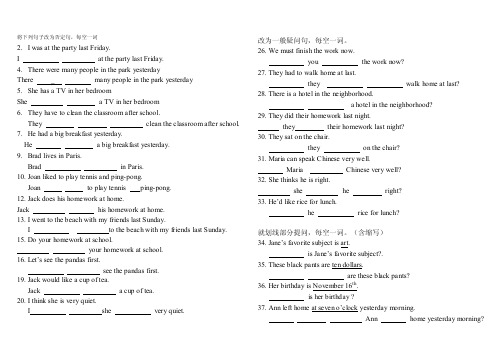
将下列句子改为否定句,每空一词2. I was at the party last Friday.I at the party last Friday.4. There were many people in the park yesterdayThere _ many people in the park yesterday5. She has a TV in her bedroomShe a TV in her bedroom6. They have to clean the classroom after school.They clean the classroom after school.7. He had a big breakfast yesterday.He a big breakfast yesterday.9. Brad lives in Paris.Brad in Paris.10. Joan liked to play tennis and ping-pong.Joan to play tennis ping-pong.12. Jack does his homework at home.Jack his homework at home.13. I went to the beach with my friends last Sunday.I to the beach with my friends last Sunday.15. Do your homework at school.your homework at school.16. Let’s see the pandas first.see the pandas first.19. Jack would like a cup of tea.Jack a cup of tea.20. I think she is very quiet.I she very quiet. 改为一般疑问句,每空一词。
练习题-陈述句变否定句

陈述句变否定句一、把下列陈述句改为否定句。
1. We go to school on Sunday.2. We’ll go to the park this afternoon.3. I am watching TV now.4. Jack’father is a teacher.5. The dog runs fast.6. The baby can speak.7. There is some water in the bottle.8. Her mother works hard.9. They like reading books.10. We had lessons this morning.11. I have a doll.12. It is a fish.13. They speak English.14. She can clean the bedroom.15. I have some money in my pocket.Answer:1. We go to school on Sunday.We don’tgo to school on Sunday.2. We’ll go to the park this afternoon.We won’tgo to the park this afternoon.3. I am watching TV now.I am not watching TV now.4. Jack’father is a teacher.Jack’father isn’t a teacher.5. The dog runs fast.The dog doesn’trun fast.6. The baby can speak.The baby can’tspeak.7. There is some water in the bottle.There isn’tany water in the bottle.8. Her mother works hard.Her mother doesn’twork hard.9. They like reading books.They don’tlike reading books.10. We had lessons this morning.We didn’thave lessons this morning.11. I have a doll.I don’thave a doll.12. It is a fish.It isn’t a fish.13. They speak English.They don’tspeak English.14. She can clean the bedroom.She can’tclean the bedroom.15. I have some money in my pocket. I don’t have any money in my pocket.陈述句变否定句的练习题I.B e 动词1.He is a boy._______________________________________________ 2.I am your friend._______________________________________________ 3.My sister is a beatiful girl._______________________________________________ 4.My mother is a worker._______________________________________________ 5.They are in the classroom._______________________________________________ 6.There are some books on the bookshelf._______________________________________________ 7.I was at home yesterday._______________________________________________ 8.They were in Beijing ten years ago._______________________________________________ 9. I am looking for a job recently.______________________________________________ 10. The students are playing basketball in the playground. ______________________________________________II.情态动词1.Lucy will be back in a week.______________________________________________2.She can sing a song and draw a picture.______________________________________________3.You can use the dictionary.______________________________________________4.Peter need go home tomorrow.______________________________________________5.You should line up when you wait for a bus.______________________________________________6.We need learn something to cook.______________________________________________7.I can write a book.______________________________________________8.You should say “Sorry” to somebody who you hurt him. ______________________________________________9.He must stay at home to finish his homework.______________________________________________10. I can go to Shanghai Zoo.______________________________________________III.实意动词1.We come from China.______________________________________________ 2.We like the mask.______________________________________________ 3.He likes the violin.______________________________________________ 4.Have some bread, Tom.______________________________________________ 5.Please open your books.______________________________________________ 6. I like Chinese、Maths、Art and PE.______________________________________________ 7.She has a shower in the morning.______________________________________________ 8.Peter did lots of work in the company last night.______________________________________________ 9.They had a lot of fun in past ten years.______________________________________________ 10.I used to play the piano.______________________________________________answer:Be动词1. He is a boy. He is not a boy.2. I am your friend. I am not your friend.3.My sister is a beatiful girl. My sisteris not a beatiful girl.4.My mother is a worker. My mother is not a worker.5.They are in the classroom. They arenot in the classroo.6.There are some books on the bookshelf. There are not any books on the bookshelf.7. I was at home y esterday. I was not at home yesterday.8. They were in Beijing ten years ago. They were not in Beijing ten years ago.9. I am l ooking for a job recently. I am not looking for a job recently.10. The students are playing basketball in the playground.The students are not playing basketball in the playground.II.情态动词11.Lucy will be back in a week.Lucy will not be back in a week.12.She can sing a song and draw apicture.She can not sing a song and draw apicture.13.You can use the dictionary.You can not use the dictionary.14.Peter need go home now.Peter need not go home now15.You should line up when y ou waitfor a bus.You should not line up when you waitfor a bus.16.We need learn something tocook.We need not learn anything to cook.17.I can write a book.I can not write a book.18.You should say “Sorry” tosomebody who you hurt him.You should not say “Sorry” tosomebody who you hurt him.19.He must stay at home to finishhis homework.He must not stay at home to finish hishomework.20.I can go to Shanghai Zoo.I can not go to Shanghai Zoo.III.实意动词21. We come from China.We don’t come from China.22.We like the mask.We don’t like the mask.23.He likes the violin.He doesn’t like the violin.24.Have some bread, Tom.Do not have any bread, Tom.25.Please open your books.Please do not open your books26.I like Chinese、Maths、Art and PE.I don’t like Chinese、Maths、Art andPE27.She has a shower in the morning.She doesn’t have a shower in themorning.28.Peter did lots of work in thecompany last night.She didn’t do a lot of work in thecompany last night.29.They had a lot of fun in past tenyears.They didn’t have a lot of fun in pastten years.30.I used to play the piano.I didn’t use to play the piano.把下面的句子变成否定句。
肯定句变为否定句的方法一般疑问句的回答

课时七:肯定句变为否定句的方法一般疑问句的回答1)肯定句变为否定句的方法把肯定句改成否定句分以下情况:1、句中有be动词的,在be动词后加not;2、句中有情态动词的(can ,should,must ,would),在情态动词后面加not;3、句中没有be动词和情态动词的,在动词前加d on’t或doesn’t ;①句中动词为原形的,加d on’t.如: I like apples. →I do n’t like apples.②句中动词为三单式的,加does n’t,并将三单式的动词还原成原形。
如:He likes apples.→ He does n’t like apples.③时态为过去时的,要加didn’t 而且动词过去式要改为原形,例:I went to school yesterday .→I didn’t go to school yeaterday .4.肯定句中的some在否定句中应改为any如:There are some students in the classroom.→ There are not any students in the classroom.2) 一般疑问句的回答a) Is Jim a student? b) Can I help you?c) Does she like salad? d) Do they watch TV?e) Is she reading?肯定回答: a) Yes, he is. b) Yes, you can. c) Yes, she does. d) Yes, they do. e) Yes, she is.否定回答: a) No, he isn’t. b) No, you can’t. c) No, she doesn’t. d) No, they don’t. e) No, she isn’t.由Be动词来问,也由Be 动词来回答be : am is areAm I a teacher? Yes,you are . No,you aren't.Is he Tom? Yes,he is . No,he isn't.Is she your friend? Yes,she is . No,she isn't.Is Lucy 8 years old ? Yes,she is. No,she isn't.Is there a book on the desk? Yes,there is .No,there isn'由助动词do, does, did, will提问,也用它们来回答Do you have a book? Yes,I have. No, I haven't.Does he have a pen? Yes,he does. No,he doesn't.Does it like to sleep? Yes,it does. No,it doesn't.Did you lost your way? Yes,I did. No,I didn't.Will he go to the zoo? Yes,he will. No,he Won't.Will you go home? Yes,I will. No,I Won't.情态动词,用can 问,也用它来答Can you sing? Yes,I can. No,I can't.Can he swim? Yes,he can. No,he can't.特殊情况Must I go to school? Yes,you have to. No,you needn't.课堂练习将下列各句改成否定句1、Tom’s brother is walking in the park.________________________________2、His father is driving a bus.__________________________________________3、 The students of Class 5 are cleaning the classroom._________________________________________________4、Their dog is playing in the room.______________________________________5、Tom and Mary are friends._______________________________6、 These buses are new._________________________7、 There are some books in the bookcase.______________________________________8、There is a banana in the box._____________________________9、I’m a student._______________________把下列句子改写为否定句、一般疑问句及肯定、否定回答1. His father is an English teacher.2. These cats are crying.3. They can swim. I must do my homework now4. I like reading English.5. His sister goes to school on foot.6. Her birthday is on the twentieth of November.7. Mrs. Li and Kitty are in a big shop.8. Kitty is wearing her new uniform.9. Mrs. Li and Kitty watch TV at night.10. I do my homework after school.课后练习把下列句子改写为否定句、一般疑问句及肯定、否定回答1. The boy does some housework at home.2. We are from China.3. Jim has some books.4. I have many books about English.5. My aunt often watches TV.6. There are 5 students in the classroom.7. My parents can play tennis.8. They are my grandparents.9. He is watering the flowers in the park.10. Gina wants a cup of coffeeAre you a student? Are you students? Is that a pencil? Is this a pen? Is it a cat? Does he have an eraser? Did they go swimming? Will they go home? Did he go to school? Can she draw? Can they dance?。
小升初英语语法专项提高训练陈述句改为否定句(含答案解析)
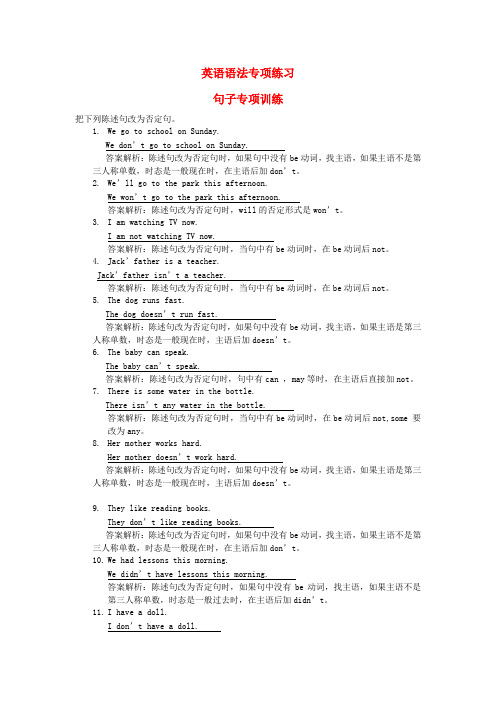
英语语法专项练习句子专项训练把下列陈述句改为否定句。
1.We go to school on Sunday.We don’t go to school on Sunday.答案解析:陈述句改为否定句时,如果句中没有be动词,找主语,如果主语不是第三人称单数,时态是一般现在时,在主语后加don’t。
2.We’ll go to the park this afternoon.We won’t go to the park this afternoon.答案解析:陈述句改为否定句时,will的否定形式是won’t。
3.I am watching TV now.I am not watching TV now.答案解析:陈述句改为否定句时,当句中有be动词时,在be动词后not。
4.Jack’father is a teacher.Jack’father isn’t a teacher.答案解析:陈述句改为否定句时,当句中有be动词时,在be动词后not。
5.The dog runs fast.The dog doesn’t run fast.答案解析:陈述句改为否定句时,如果句中没有be动词,找主语,如果主语是第三人称单数,时态是一般现在时,主语后加doesn’t。
6.The baby can speak.The baby can’t speak.答案解析:陈述句改为否定句时,句中有can ,may等时,在主语后直接加not。
7.There is some water in the bottle.There isn’t any water in the bottle.答案解析:陈述句改为否定句时,当句中有be动词时,在be动词后not,some 要改为any。
8.Her mother works hard.Her mother doesn’t work hard.答案解析:陈述句改为否定句时,如果句中没有be动词,找主语,如果主语是第三人称单数,时态是一般现在时,主语后加doesn’t。
把下列句子变为否定句
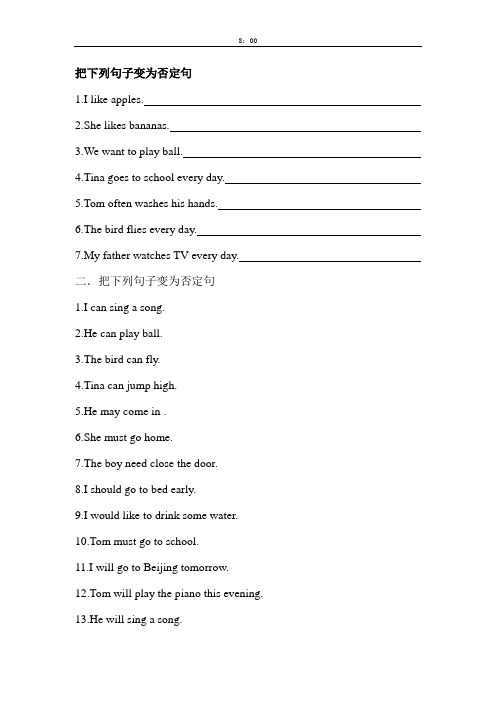
把下列句子变为否定句1.I like apples.2.She likes bananas.3.We want to play ball.4.Tina goes to school every day.5.Tom often washes his hands.6.The bird flies every day.7.My father watches TV every day. 二.把下列句子变为否定句1.I can sing a song.2.He can play ball.3.The bird can fly.4.Tina can jump high.5.He may come in .6.She must go home.7.The boy need close the door.8.I should go to bed early.9.I would like to drink some water.10.Tom must go to school.11.I will go to Beijing tomorrow.12.Tom will play the piano this evening.13.He will sing a song.14.She will get home at 8 o’clock.15.Tina will wash coats.16.My mother will go to the park next week.17.The girl will dance in the room.18.The boy will come back soon.19.Cindy will eat a hamburger.20.Mom will buy a gift for me.21.I went to the park last week.22.:He ate a cake just now.23.The boy got home two minutes ago.24.They ran in the park just now.25.The bird flew away yesterday.26.The girl cried last night.27.Jack was ill the day before yesterday.28.We were hungry just now.29.Tom stayed at home yesterday.30 Lily drew a picture last month.31. I am from Changchun.32.This is a bird.33.Those are tomatoes.34.I like hamburgers35.He goes to school everyday.。
把下列句子变为否定句
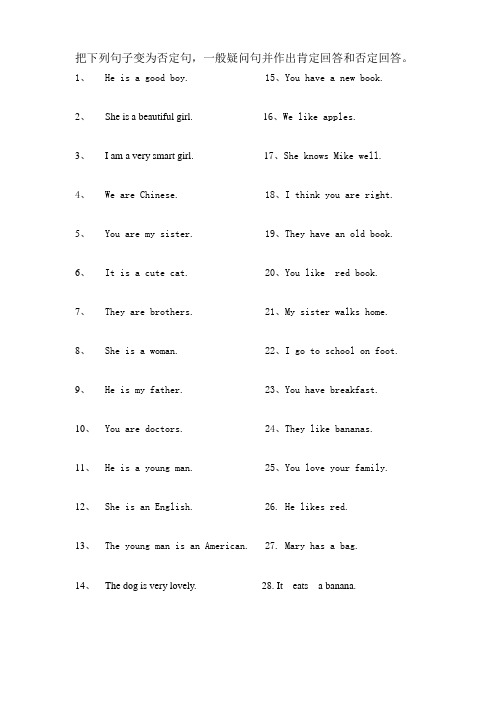
把下列句子变为否定句,一般疑问句并作出肯定回答和否定回答。
1、He is a good boy. 15、You have a new book.2、She is a beautiful girl. 16、We like apples.3、I am a very smart girl. 17、She knows Mike well.4、We are Chinese. 18、I think you are right.5、You are my sister. 19、They have an old book.6、It is a cute cat. 20、You like red book.7、They are brothers. 21、My sister walks home.8、She is a woman. 22、I go to school on foot.9、He is my father. 23、You have breakfast.10、You are doctors. 24、They like bananas.11、He is a young man. 25、You love your family.12、She is an English. 26. He likes red.13、The young man is an American. 27. Mary has a bag.14、The dog is very lovely. 28. It eats a banana.把下列单数句子变为复数句子,复数句子变为单数句子。
1、Our shirts are blue. 15、His coat is small.2、These are girls . 16、You are our sisters.3. He is a student. 17、We are good friends.4、We are teachers. 18、She is very smart.5. They are workers. 19、They are teachers.6、This is a new pen. 20、She is my sister.7、That is an English pen. 21、It is a dog.8、These are computers. 22、We are in Class Three.9、They are new workers. 23、My math teacher is good .10、They have bags. 24、Your book is nice.11、This is my pencil. 25、His father is a doctor.12、That is his pencil.13、They are good doctors.15、You are my teacher.1.He is a good boy. 13. This is a book.2.She is a beautiful girl.14. That is a car.3.I am a very smart girl.15. This is an old desk. 4.You are my sister.5.It is a cute cat. 16. That is a pear.6. She is a woman.7.He is my father.8.You are a doctor.9.He is a young man.10.She is an English.11.The young man is an American.15、You have a new book.16、We like apples.17、She knows Mike well.18、I think you are right.19、They have an old book.20、You like red book.21、My sister walks home.22、I go to school on foot. 23、You have breakfast.24、They like bananas.25、You love your family.26. He likes red.27. Mary has a bag.28. It eats a banana.把下列句子变成否定句,一般疑问句,并作肯定和否定回答。
肯定句改为否定句的方法
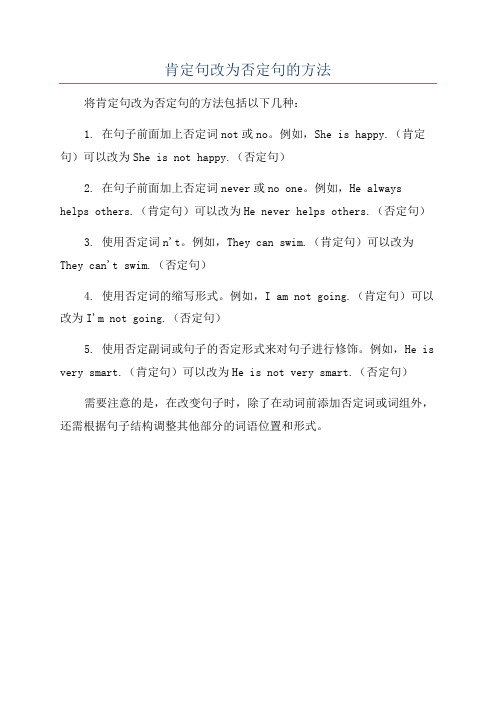
肯定句改为否定句的方法
将肯定句改为否定句的方法包括以下几种:
1. 在句子前面加上否定词not或no。
例如,She is happy.(肯定句)可以改为She is not happy.(否定句)
2. 在句子前面加上否定词never或no one。
例如,He always helps others.(肯定句)可以改为He never helps others.(否定句)
3. 使用否定词n't。
例如,They can swim.(肯定句)可以改为They can't swim.(否定句)
4. 使用否定词的缩写形式。
例如,I am not going.(肯定句)可以改为I'm not going.(否定句)
5. 使用否定副词或句子的否定形式来对句子进行修饰。
例如,He is very smart.(肯定句)可以改为He is not very smart.(否定句)需要注意的是,在改变句子时,除了在动词前添加否定词或词组外,还需根据句子结构调整其他部分的词语位置和形式。
将下列句子改为否定句

将下列句子改为否定句,每空一词(含缩写)1. Vera is drawing in the classroom.Vera _ __ ____ drawing in the classroom.2. I was at the party last Friday.I at the party last Friday.3. They’re playing soccer now.They playing soccer now.4. There were many people in the park yesterdayThere _ many people in the park yesterday5. She has a TV in her bedroomShe a TV in her bedroom6. They have to clean the classroom after school.They clean the classroom after school.7. He had a big breakfast yesterday.He a big breakfast yesterday.8. They come from Canada.They Canada.9. Brad lives in Paris.Brad in Paris.10. Joan liked to play tennis and ping-pong.Joan to play tennis ping-pong.11. Nancy and Mark want to go to the movies.Nancy and Mark to go to the movies.12. Jack does his homework at home.Jack his homework at home.13. I went to the beach with my friends last Sunday.I to the beach with my friends last Sunday.14. Nick practices his guitar in the morning.Nick his guitar in the morning.15. Do your homework at school.your homework at school.16. Let’s see the pandas first.see the pandas first.17. My father works in a big hospital.My father in a big hospital.18. The little girl can play the piano well.The little girl the piano well.19. Jack would like a cup of tea.Jack a cup of tea.20. I think she is very quiet.I she very quiet.改为一般疑问句,每空一词。
肯定句变否定句的基本方法

肯定句变否定句的基本方法一、动词be 的否定式动词be根据不同的人称和时态可以有am, is, are, was,were等不同形式,可用作连系动词(表示“是"、“在”等)和助动词(用于构成进行时态和被动语态等),但不管何种情况,构成否定式时,一律在其后加notI’m old,but you’re young. 我老了,但你还年轻。
→I'm not old,but you're not young. 我还不老,但你不年轻了。
He was reading and I was writing。
他在读,我在写.→He was not reading and I was not writing。
他没有在读,我没有在写。
二、动词have 的否定式动词have根据不同的人称和时态可以有have,has,had等形式,可以用作实意动词和助动词,分以下情况讨论1. 用作实意动词表示状态,如表示拥有、患病或用于have to表示“必须”等,在构成否定式时可以直接在其后加not,也可根据情况在其前使用don’t, doesn't, didn’tHe has a car. 他有辆小汽车。
→He hasn’t a car. / He doesn’t have a car. 他没有小汽车.He had some dictionaries. 他有一些词典。
→He hadn’t any dictionaries。
/ He didn’t have any dictionaries。
他没有词典。
You have to go with him。
你必须同他一起去。
→You haven’t to go with him. / You don’t have to go w ith him. 你不必同他一起去. 【注】have to构成否定式时以在其前加don’t等较为常见。
2. 用作实意动词表示动作,如表示“吃(=eat)”、“喝(=drink)”、“拿(=take)”、“收到(=receive)"、“度过(=spend)"等,构成否定式时不能直接在其后加not,而应根据情况在其前使用don't, doesn’t,didn’tHe had some cake for breakfast。
英语肯定句改否定句
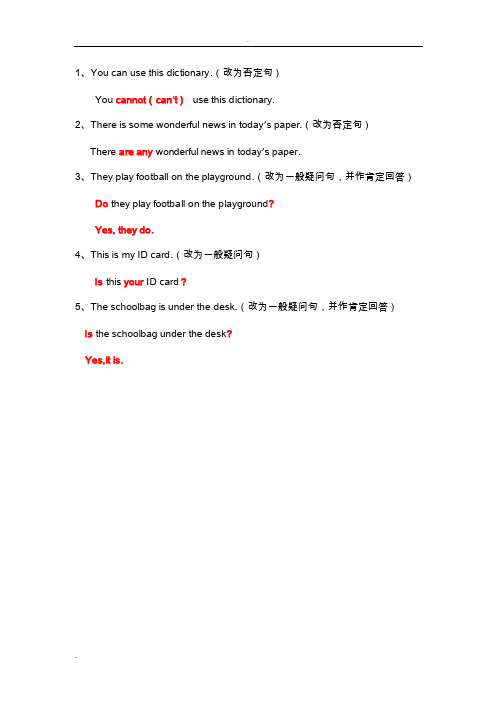
1、You can use this dictionary.(改为否定句)You cannot(can’t)use this dictionary.2、There is some wonderful news in today’s paper.(改为否定句)There are any wonderful news in today’s paper.3、They play football on the playground.(改为一般疑问句,并作肯定回答)Do they play football on the playground?Yes, they do.4、This is my ID card.(改为一般疑问句)Is this your ID card?5、The schoolbag is under the desk.(改为一般疑问句,并作肯定回答)Is the schoolbag under the desk?Yes,it is.一、肯定句改否定句的方法:1、在be动词后加not。
如:is not ,are not ,am not,was not,were not;2、在can,should,will等后加not。
如:cannot,should not,will not;3、上述都没有的,在动词前加助动词否定形式don’t/doesn’t/didn’t。
4、some 改成any。
如:I am a girl. →I am not a girl.You are a student. →You are not a student.→You aren’t a student.This is Tom’s bag, →This is not Tom’s bag.→This isn’t Tom’s bag.答题方法是;否定词no t在be后边。
二、肯定句改一般疑问句的方法:1、把be动词放在句首,剩下的照抄,(some 改成any,I改成you,my改成your,)句点改成问号。
变否定句规则
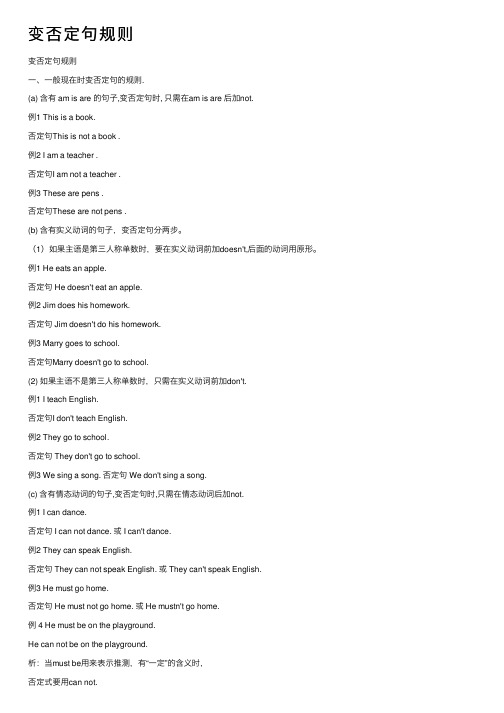
变否定句规则变否定句规则⼀、⼀般现在时变否定句的规则.(a) 含有 am is are 的句⼦,变否定句时, 只需在am is are 后加not.例1 This is a book.否定句This is not a book .例2 I am a teacher .否定句I am not a teacher .例3 These are pens .否定句These are not pens .(b) 含有实义动词的句⼦,变否定句分两步。
(1)如果主语是第三⼈称单数时,要在实义动词前加doesn't,后⾯的动词⽤原形。
例1 He eats an apple.否定句 He doesn't eat an apple.例2 Jim does his homework.否定句 Jim doesn't do his homework.例3 Marry goes to school.否定句Marry doesn't go to school.(2) 如果主语不是第三⼈称单数时,只需在实义动词前加don't.例1 I teach English.否定句I don't teach English.例2 They go to school.否定句 They don't go to school.例3 We sing a song. 否定句 We don't sing a song.(c) 含有情态动词的句⼦,变否定句时,只需在情态动词后加not.例1 I can dance.否定句 I can not dance. 或 I can't dance.例2 They can speak English.否定句 They can not speak English. 或 They can't speak English.例3 He must go home.否定句 He must not go home. 或 He mustn't go home.例 4 He must be on the playground.He can not be on the playground.析:当must be⽤来表⽰推测,有“⼀定”的含义时,否定式要⽤can not.例5You must say something at the mecting.You needn’t say anything at the mecting.析:当“must+⾏为动词”⽤来表⽰“必须”的含义时,其否定式可⽤needn’t 或mustn't表⽰“不需要”,“不必”,语⽓委婉,must not表⽰“禁⽌”,“千万别”语⽓⽣硬。
- 1、下载文档前请自行甄别文档内容的完整性,平台不提供额外的编辑、内容补充、找答案等附加服务。
- 2、"仅部分预览"的文档,不可在线预览部分如存在完整性等问题,可反馈申请退款(可完整预览的文档不适用该条件!)。
- 3、如文档侵犯您的权益,请联系客服反馈,我们会尽快为您处理(人工客服工作时间:9:00-18:30)。
3.句子中既没有be动词也没有情
态动词时,借助助动词(do 和
does),在助动词后+not,后边动
词还原.
don’t/doesn’t
• 1.I have an apple. • I don’t have an apple. • 2.She likes hamburgers . • She doesn’t like hamburgers . • 3. Li Shan has some bananas. • Li Shan doesn’t have any bananas.
助助动词(do 和does),在助动词后+not,后边
动词还原.
don’t/doeare)动 词时,在be(am is are)后+not.
am not/isn’t/aren’t
• 1.She is a teacher. • She is not(isn’t) a teacher • 2.They are good friends . • They are not (aren’t)good friends • 3.Li Shan and Su Nan are students. • Li Shan and Su Nan are not (aren’t)
students.
2.当句子中有“情态动词” (can ,will)时,在“情态动词” (can ,will)后+not.
can’t/won’t
• 1.She can swim. • She can not (can’t) swim • 2.Li Shan can sweep the floor. • Li Shan can not (can’t)sweep the
把句子改为否定句
• 1.当句子中有be(am is are)动词时,在be (am is are)后+not. am not/isn’t/aren’t
• 2.当句子中有“情态动词”(can ,will)时,在 “情态动词”(can ,will)后+not. can’t/won’t
• 3.句子中既没有be动词也没有情态动词时,借
